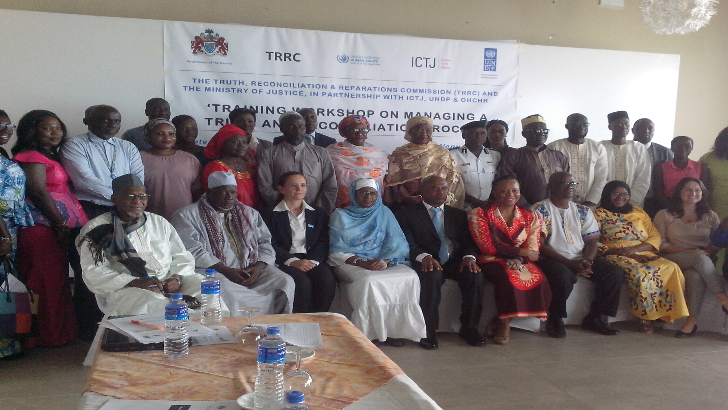By Kebba Ansu Manneh
President Adama Barrow has on Monday, 15 October 2018, launched the Truth, Reconciliation and Reparations Commission (TRRC) marking the beginning of the probe into atrocities and abuses committed by his predecessor Yahya Jammeh.
The TRRC was established by an Act of the National Assembly in Dec. 2018 and mandated to probe into the alleged human rights abuses committed during the twenty-two years rule of former president Jammeh.
In January 2018, President Barrow assented to the bill and thus setting the commission in motion with the appointment of an Executive Secretary, a veteran journalist Dr. Baba Galleh Jallow of the defunct Independent Newspaper.
The question that remains unanswered, however, is what’s next after the launching of the truth commission.
In his speech at the launching ceremony, President Barrow said, “as a government we feel that beyond establishing the truth and fostering national reconciliation there is a crucial need to focus on victims at the center of the process. It’s for this reason that we included reparations in our Gambian model, a truth, reconciliation and reparations commission.” Reparations is one area that many of the victims and their families are highly anticipating.
Ms. Fatou Bum Bensouda, the Gambian-born Chief Prosecutor of the International Criminal Court (ICC), who attended the launching of the TRRC concurred that the reconciliation component of the commission will be key to the restorative justice in ensuring that any societal features are managed through every reflective structure, objective and inclusive process where victims will fully participate to tell their stories and whether forgiveness are appropriate and reconciliation takes place.
The commission came under numerous attacks since its creation as critics questioned the appointment of the executive secretary and his recruitment of some key staff casting doubts over the impartiality of the proceedings. Many of the critics considered Dr. Jallow and one of his hires as victims of the former government they are now charged to investigate. Some critics also argued that alleged perpetrators, with capacities to tamper with evidence, are still heading and working in key government offices.
Sheriff Kijera, the coordinator of the Victims Centre for Human Rights Violation (VCHRV), expressed dissatisfaction over the process and continuity in position of some alleged perpetrators in government.
“It is disappointing to note that institutional reforms hasn’t been quite methodical as it is supposed to be. Alleged perpetrators and enablers of atrocities committed under the Jammeh regime still find it comfortable holding lucrative positions in government, while victims continue to suffer indignity of the experiences of inhuman, degrading treatments and their deteriorating health and medical conditions which the government completely ignored and failed to address,” Mr. Kijera vented in frustration.
The TRRC, Mr. Kijera hoped, can help to address impunity and recognize the rights of the victims through the provision of reparations.
An anonymous entrepreneur whose business was attacked for many years, and went through legal battles with the Jammeh regime said that reparation should not be the end of the game but truth be established and perpetrators be prosecuted.
“We expect the commission to be highly transparent, impartial and sensitive to its proceedings. We have seen in other countries where similar commissions have been established but without implementing the recommendations and this is our fear as victims.” he revealed.
According to him, the TRRC should be cautious in establishing the truth, compensating the victims at the right time and prosecuting perpetrators as a means of a healing a divided nation.
Lamin Fatty, a journalist who spend nearly a decade in exile in neighboring Senegal, said they are hopeful that justice will be served, perpetrators get booked, and victims compensated.
But how long will it take for victims to be compensated and perpetrators charged is the more intriguing question as the mandate of the commission is two years.

